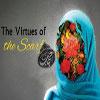
Before we begin our discussion, it is necessary to look at the meaning of the word hijab which is used in our age to refer to a woman's covering. This word gives the sense of 'covering' because it refers to a veil or a means of 'covering'. Perhaps it can be said that because of the origin of the word, not every covering is hijab. That 'covering' which is referred to as a hijab is that which appears behind a curtain. The Holy Quran describes the setting of the sun in the story of the Prophet Solomon,
The diaphragm separating the heart from the stomach is also called 'hijab'.
The use of the word satr, in the sense of 'covering' was used instead of hijab, especially by the religious jurisprudents. The religious jurisprudents, whether in the section on the ritual prayers or in the section on marriage, refer to this issue and use the word satr and not hijab.
It would have been best if the word had not been changed and we had continued to use the word 'covering' or satr because, as we have said, the prevalent meaning of the word hijab is veil. If it is to be used in the sense of 'covering', it gives the idea of a woman being placed behind a curtain. This very thing has caused a great number of people to think that Islam has wanted women to always remain behind a curtain, to be imprisoned in the house and not to leave it.
The verses of the Holy Quran which refer to this issue affirm this and the edicts of the religious jurisprudents confirm it. We will refer to the extent of this covering by using the Quran and the Sunnah as sources. The relevant verses do not refer to the word hijab. Verses which refer to this issue, whether in Surah Nur (Chapter 24) or Surah Ahzab (Chapter 33), have mentioned the extent of the covering and contacts between men and women without using the word hijab. The verse in which the word hijab is used refers to the wives of the Holy Prophet of Islam.
We know that in the Holy Quran there are special commands about the Prophet's wives. The first verse addressed to them begins,
Islam held the special relationship of the wives of the Prophet in such a great esteem that they were to remain at home for basically political and social reasons during the lifetime of the Holy Prophet and after his death. The Holy Quran says directly to the wives of the Prophet,
Islam desired that the honor and respect of these 'Mothers of the Believers', who were held in great respect by the Muslims, not be misused and that they do not become a political and social tool for selfish and ambitious men.
The verse in which the word hijab is used is,
According to history and Islamic tradition, when ever you see the 'verse of hijab' referred to, for instance, "such and such was the case before the revelation of 'the verse of hijab" " or "such and such was the case after the revelation of 'the verse of hijab"", it refers to this verse which relates to the wives of the Prophet and not the verses of Surah Nur which states,
Or the verse of Surah Ahzab which states,
But there is a question as to why, in the recent era, the current expression of the religious jurisprudents, that is, satr, did not become prevalent instead of hijab? The reason is unknown. Perhaps they mistook the Islamic hijab for the hijab which is traditional in other countries. We will give further explanation about this later articles.
source : tebyan













